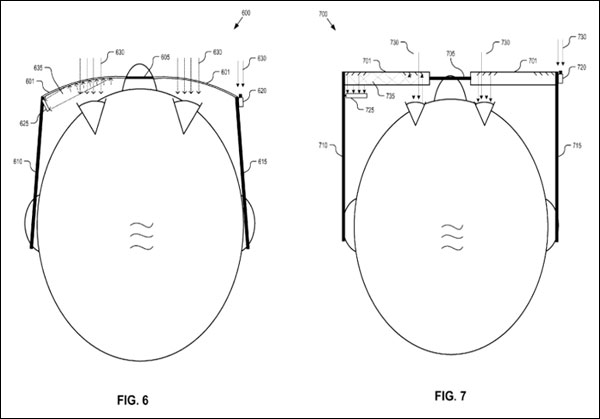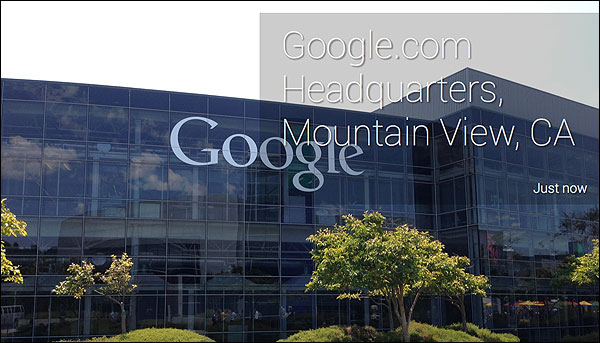Pay-Per-Gaze Advertising: New Google Patent May Reveal Plans For Monetizing Google Glass
Google has been granted a patent that appears to reveal some far-reaching plans for the eye-tracking sensor that exists — but currently isn’t formally used — on Google Glass. And if you think those plans must include some form of advertising, you’d be correct. In the patent, Google is calling it “pay-per-gaze” advertising, and it […]

And if you think those plans must include some form of advertising, you’d be correct.
In the patent, Google is calling it “pay-per-gaze” advertising, and it involves charging advertisers if the user looks at an ad — online or offline — while wearing Glass.
To be clear, the patent — which was filed in May 2011 and granted on Tuesday — doesn’t specifically mention Google Glass by name, and the application includes images that look more like traditional two-lens glasses than Google Glass:
But it does refer to “eyeglasses” that have “side-arms that engage ears of the user” and lenses with “at least one forward facing scene camera disposed on the eyeglasses.” Those descriptions fit the current incarnation of Google Glass. And keep in mind that some early prototypes of Glass did sport a standard dual-lens design.
Google’s Gaze-Tracking Patent
The patent specifically covers a gaze-tracking technique that uses an eye-tracking sensor to determine what the wearer is looking at. But what’s interesting is what Google says that it might do with a gaze-tracking system in place:
Charge Companies If Users Look At An Ad
The patent includes a claim that Google could try to charge companies if the wearer happens to see an ad while wearing the device:
… determining which, if any, of the identified items within the external scenes viewed by the user are advertisements; and charging advertisers associated with the advertisements based at least in part on a per gaze basis.
The patent calls it pay-per-gaze advertising. And it doesn’t matter if the user sees an ad online or offline.
Pay per gaze advertising need not be limited to on-line advertisements, but rather can be extended to conventional advertisement media including billboards, magazines, newspapers, and other forms of conventional print media. Thus, the gaze tracking system described herein offers a mechanism to track and bill offline advertisements in the manner similar to popular online advertisement schemes.
Advertisers could be charged based on whether the user looked directly at the ad and, if so, for how long. The patent also says Google could collect (and charge advertisers for) analytical data such as how long an ad held the user’s gaze and what emotional response it generated. Emotional response would be determined, in part, on the user’s pupil dilation while looking at the ad.
Yes, it’s creepy. It’s outlandish. And it’s pure Google.
About those analytics, the patent says that “personal identifying data may be removed from the data and provided to the advertisers as anonymous analytics” and users may have opt-in/opt-out privileges to control what, when and how data is being gathered.
Provide Automatic, Augmented Search Results
The patent also includes a form of augmented reality, where “search results” would be shown to the user based on what s/he’s looking at — without the user ever having to even speak a query.
The patent calls this “latent pre-searching.”
… latent pre-searching can improve visual searching to identify an item by triggering the visual search when it first enters the user’s peripheral view before it reaches his direct gaze and speed up potential informational searches on identified items submitted by the user. In one embodiment, once a latent pre-search has identified a particular item, the informational search may also be automatically triggered as a latent pre-search and the informational results also queued for quick, on-demand user retrieval.
These visual searches would be stored in a “gazing log” and the user would be able to go back and see all the things s/he viewed in this personal viewing history.
Final Thoughts
This is probably a good time to mention that just because Google (or any company) is granted a patent, it’s no guarantee that the patent will ever be used.
Nonetheless, this one offers an interesting (and kinda creepy) look at how Google might use the eye-tracking sensor on Glass in the future.
(tip via Fast Company / second image created with GlassSim.com)
Postscript, April 19: For more on this story, please see a new article: Google: We Have No Plans To Use Pay-Per-Gaze Advertising Patent.
Opinions expressed in this article are those of the guest author and not necessarily MarTech. Staff authors are listed here.
Related stories

